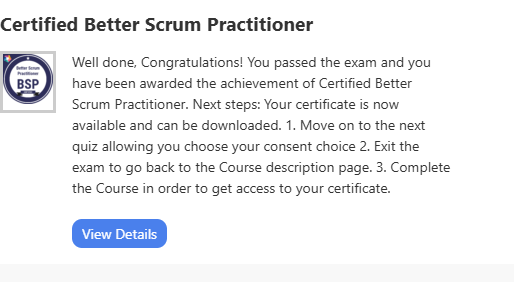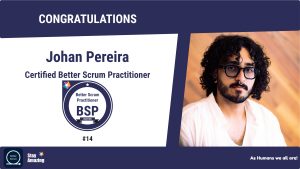Johan joined a Better Scrum cohort in 2023, and recently became a Certified Better Scrum Practitioner. Not only that, Johan persisted on the exams until he achieved 100%


To understand better Johan’s determination, we asked him a few questions to understand his perspective. Johan replied promptly to 5 questions, here is the log of what he had to say.
Q. How would you describe your journey from cohort participation to becoming a certified BSP?
“The transition wasn’t just about acquiring knowledge, but about embodying the values and principles that make Scrum effective”
Looking back, my journey from joining the Stay Amazing cohort to becoming a certified Better Scrum Practitioner (BSP) has been a transformative and deeply rewarding experience, even though it was a long one in my case! :p
When I first entered the program, I was invited by Becky, my Agile Coach, who saw it as a great opportunity to deepen my understanding of Scrum. I didn’t anticipate just how constructive the experience would be for my professional identity.
The cohort format fostered a sense of community and psychological safety. Marco, in particular, is one of the sweetest and most passionate people I’ve ever met, which made engagement easy and enjoyable. The collaborative environment mirrored both the principles of Scrum and Lean Thinking (which I was a bit rusty on), allowing me to practice fundamentals from a new, combined perspective.
As I progressed through the modules, I found myself naturally returning to the fundamentals that had always been rooted in my professional instincts, but which I’d almost forgotten how to articulate. The focus on Kaizen, continuous improvement, and empiricism fostered a mindset of curiosity and resilience, which has been invaluable as I’ve grown into seniority. The transition wasn’t just about acquiring knowledge, but about embodying the values and principles that make Scrum effective: focus, commitment, courage, openness, and respect. The cohort was a great way to reconnect with those values from a safe, fresh perspective—a community of practice outside my daily professional life, for which I’m truly grateful.
Q. What have you learned about yourself?
“The emphasis on empiricism and regular inspection made me more comfortable with uncertainty and change, both personally and professionally”
One of the most profound realizations during this journey was how much I value creating environments where people feel empowered and trusted. I was also inspired by Marco’s mentoring style, which I found highly motivating.
I rediscovered my strengths in facilitating structured communication and fostering collaboration—skills that are essential for high-performing teams. The emphasis on empiricism and regular inspection made me more comfortable with uncertainty and change, both personally and professionally, teaching me to see challenges as opportunities for adaptation and growth.
Q. What specific part of Better Scrum enabled you to learn about yourself?
“Allowed me to reflect on my leadership style and refine it continuously”
I think one of the most important things highlighted by Better Scrum is the perfect combination for self-discovery: psychological safety and the use of retrospective sessions to reveal growing opportunities.
Retrospectives are about inspecting effectiveness and quality, and finding ways to improve both, but they’re weakened without psychological safety. Fostering that safety is a challenge I believe all Scrum Masters must go through, starting with our own self-acceptance.
Better Scrum encouraged me to approach feedback with openness and to view it as a tool for personal and team growth. The iterative nature of Scrum, combined with the safety to experiment and fail, allowed me to reflect on my leadership style and refine it continuously.
Q. How has the different stages of learning Better Scrum helped you in the workplace?
“Inspired me to nurture autonomy within my teams”
Each stage of learning Better Scrum has had a tangible impact on my work. Early on, reconnecting with the empirical pillars—transparency, inspection, and adaptation—helped me drive more meaningful conversations around value and alignment, not only with my team but with the whole organization.
As I advanced, the focus on self-management and empowerment inspired me to nurture autonomy within my teams and to help the organization understand the value of those principles for adaptability and true ownership.
Q. What would be different now you have mastered purpose, principles and values?
“Better Scrum hasn’t just made me a better professional, it’s made me a more adaptive, value-driven human being”
Now that I’ve internalized the purpose, principles, and values of Better Scrum, my approach to leadership and value delivery has returned to its roots—or so I want to believe! 😛
I am much more intentional about aligning team efforts with organizational goals and ensuring that every increment of work delivers tangible value, with high awareness of who our stakeholders are. The principles of empiricism and continuous improvement are embedded in my daily practice, especially in cross-functional initiatives like product development, risk management, and cybersecurity. Even when I’m not doing Scrum (as with DevSecOps’s Kanban), the purpose, principles, and values are still present, which for me is evidence of their intrinsic value.
By anchoring my work in these principles, I feel like a catalyst for positive change, helping my teams and organizations navigate complexity with confidence and clarity. The journey through Stay Amazing and Better Scrum hasn’t just made me a better professional—it’s made me a more adaptive, value-driven human being.
Johan is now confidently driving teams with Purpose, Principles and Values.
Sincere congratulations Johan!

